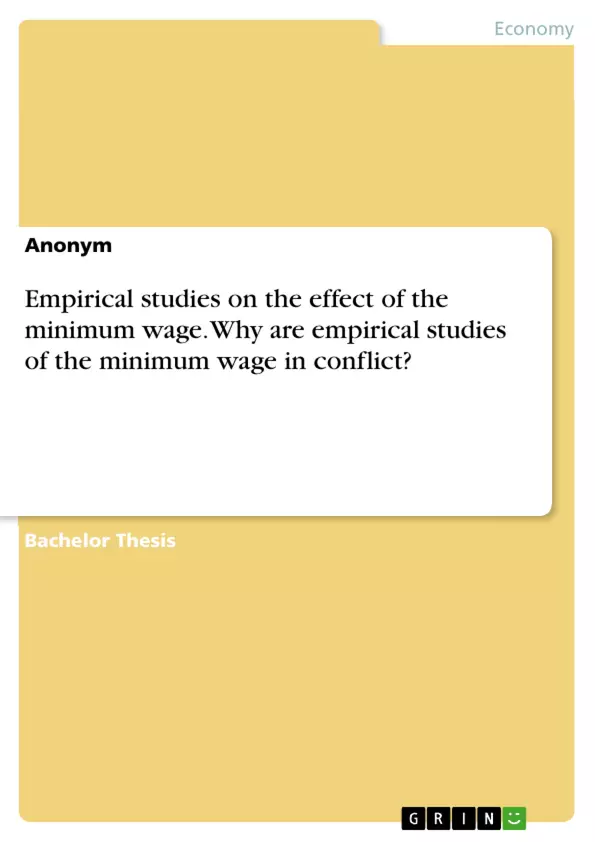The minimum wage is an often discussed topic between economists and politicians. The introduction of the minimum wage in Germany as well as in other countries leads to the emergence of new questions. Point of views on the consequences of the minimum wage differ greatly. Supporters of the minimum wage claim that the wage leads to an improvement in the well-being of low income families. Furthermore, they support the view that the introduction of the minimum wage diminishes the distance between high and low income families. On the contrary, opponents argue that the minimum wage cannot reduce inequality in low income families as the correlation between low-wage workers and their families is not strong enough. The opposed view declares that the minimum wage would target families among the entire distribution of incomes resulting in a target inefficiency and lower demand for labor and therefore higher unemployment.
Empirical research tries to evaluate the contrary discussed consequences in order to derive a conclusion on the effects of employment, income distribution, employment hours and other factors affected by a minimum wage. Some researchers infer that the minimum wage leads to the reduction of employment of low-wage workers, while other experiments conclude that the minimum wage does not have any negative employment effects and might even boost employment. Therefore, the aim of this paper is to evaluate why empirical research ascertains different point of views on the minimum wage and which factors play an important role in the development and evaluation of the experiments. Hence, this paper examines the following research question “Why are empirical studies of the minimum wage in conflict?”.
Inhaltsverzeichnis (Table of Contents)
- 1 Introduction
- 1.1 Problem identification
- 1.2 Methodological approach
- 2 Theoretical background
- 2.1 Standard competitive labor market model
- 2.1.1 Elasticity in a competitive model
- 2.2 The monopsony model
- 2.3 Efficiency wages and the Shapiro-Stiglitz Model
- 3 Empirical studies
- 3.1 Experimental studies
- 3.2 Conflicts in the minimum wage studies
- 3.3 Meta analysis on the minimum wage research
- 4 Main findings
- 4.1 Employment effects
- 4.1.1 Teenage employment
- 4.1.2 Employment effects in industrialized versus low income countries
- 4.2 Distribution of income
- 4.3 Methodological difficulties and adjustment channels
- 5 Minimum wage research in Germany
- 6 Summary and Conclusion
Zielsetzung und Themenschwerpunkte (Objectives and Key Themes)
This bachelor thesis aims to investigate the conflict surrounding empirical studies on the effect of the minimum wage. The study explores the different theoretical perspectives and empirical findings on the minimum wage’s impact on employment, income distribution, and economic growth. It further analyzes the methodological challenges and adjustment channels that complicate the assessment of minimum wage effects.
- The impact of minimum wage on employment
- The distribution of income in relation to the minimum wage
- Methodological difficulties and challenges in minimum wage research
- The impact of minimum wage in industrialized versus low income countries
- The application of minimum wage research findings in the German context
Zusammenfassung der Kapitel (Chapter Summaries)
- Chapter 1: Introduction - This chapter establishes the research problem, outlining the ongoing debate and controversy regarding the impact of the minimum wage on employment and economic outcomes. It also introduces the methodological approach employed throughout the study.
- Chapter 2: Theoretical Background - This chapter explores the theoretical frameworks commonly used to understand the minimum wage. It examines the standard competitive labor market model, the monopsony model, and the efficiency wage theory, including the Shapiro-Stiglitz model, to provide a theoretical foundation for analyzing the minimum wage's effects.
- Chapter 3: Empirical Studies - This chapter reviews existing empirical studies on the minimum wage. It examines experimental studies, discusses the conflicts arising from different research findings, and explores meta-analysis on the minimum wage research to assess the overall consensus on its effects.
- Chapter 4: Main Findings - This chapter presents the major findings from existing research on the minimum wage, focusing on the employment effects, income distribution impacts, and the challenges in accurately measuring these effects.
- Chapter 5: Minimum wage research in Germany - This chapter applies the knowledge gained from previous chapters to explore the context of minimum wage research in Germany, examining the specific challenges and implications for the German economy.
Schlüsselwörter (Keywords)
This study focuses on the key concepts of minimum wage, employment effects, income distribution, efficiency wages, theoretical models, empirical research, meta-analysis, and methodological challenges. It also examines specific research findings and explores the application of these findings in the German context.
- Citar trabajo
- Anonym (Autor), 2018, Empirical studies on the effect of the minimum wage. Why are empirical studies of the minimum wage in conflict?, Múnich, GRIN Verlag, https://www.grin.com/document/1489586



